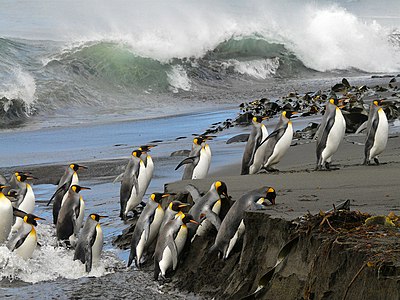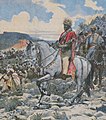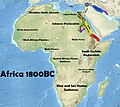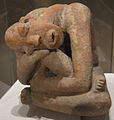Portal:Africa



Africa is the world's second largest and second-most populous continent after Asia. At about 30.3 million km2 (11.7 million square miles) including adjacent islands, it covers 20% of Earth's land area and 6% of its total surface area. With 1.4 billion people0 as of 2021, it accounts for about 18% of the world's human population. Africa's population is the youngest amongst all the continents; the median age in 2012 was 19.7, when the worldwide median age was 30.4. Despite a wide range of natural resources, Africa is the least wealthy continent per capita and second-least wealthy by total wealth, ahead of Oceania. Scholars have attributed this to different factors including geography, climate, tribalism, lack of democracy, corruption, colonialism, the Cold War, and neocolonialism. Despite this low concentration of wealth, recent economic expansion and the large and young population make Africa an important economic market in the broader global context.
Africa straddles the equator and the prime meridian. It is the only continent to stretch from the northern temperate to the southern temperate zones. The majority of the continent and its countries are in the Northern Hemisphere, with a substantial portion and a number of countries in the Southern Hemisphere. Most of the continent lies in the tropics, except for a large part of Western Sahara, Algeria, Libya and Egypt, the northern tip of Mauritania, and the entire territories of Morocco, Ceuta, Melilla, and Tunisia which in turn are located above the tropic of Cancer, in the northern temperate zone. In the other extreme of the continent, southern Namibia, southern Botswana, great parts of South Africa, the entire territories of Lesotho and Eswatini and the southern tips of Mozambique and Madagascar are located below the tropic of Capricorn, in the southern temperate zone.
Africa is highly biodiverse; it is the continent with the largest number of megafauna species, as it was least affected by the extinction of the Pleistocene megafauna. However, Africa also is heavily affected by a wide range of environmental issues, including desertification, deforestation, water scarcity and pollution. These entrenched environmental concerns are expected to worsen as climate change impacts Africa. The UN Intergovernmental Panel on Climate Change has identified Africa as the continent most vulnerable to climate change.
The history of Africa is long, varied, and complex, and has often been under-appreciated by the global historical community. Africa, particularly Eastern Africa, is widely accepted as the place of origin of humans and the Hominidae clade (great apes). The earliest hominids and their ancestors have been dated to around 7 million years ago, including Sahelanthropus tchadensis, Australopithecus africanus, A. afarensis, Homo erectus, H. habilis and H. ergaster—the earliest Homo sapiens (modern human) remains, found in Ethiopia, South Africa, and Morocco, date to circa 233,000, 259,000, and 300,000 years ago, respectively, and Homo sapiens is believed to have originated in Africa around 350,000–260,000 years ago. Africa is also considered by anthropologists to be the most genetically diverse continent as a result of being the longest inhabited. (Full article...)
Selected article –
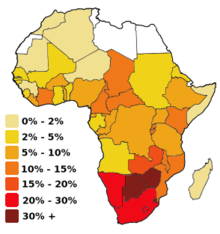
, approximately 1,100,000 people in Malawi are HIV-positive, which represents 10.8% of the country's population. Because the Malawian government was initially slow to respond to the epidemic under the leadership of Hastings Banda (1966–1994), the prevalence of HIV/AIDS increased drastically between 1985, when the disease was first identified in Malawi, and 1993, when HIV prevalence rates were estimated to be as high as 30% among pregnant women. The Malawian food crisis in 2002 resulted, at least in part, from a loss of agricultural productivity due to the prevalence of HIV/AIDS. Various degrees of government involvement under the leadership of Bakili Muluzi (1994–2004) and Bingu wa Mutharika (2004–2012) resulted in a gradual decline in HIV prevalence, and, in 2003, many people living in Malawi gained access to antiretroviral therapy. Condoms have become more widely available to the public through non-governmental organizations, and more Malawians are taking advantage of HIV testing services.
Due to several successful television and radio campaigns by the Malawian government and non-governmental organizations in Malawi, levels of awareness regarding HIV/AIDS are high among the general population. However, many men have adopted fatalistic attitudes in response to the epidemic, convincing themselves that death from AIDS is inevitable; on the other hand, some have implemented preventive techniques such as partner selection to try to reduce their risk of infection. Although many women have developed strategies to protect themselves from HIV, women are more likely to be HIV-positive than men in Malawi. The epidemic has affected sexual relationships between partners, who must cooperate to protect themselves from the disease. In addition, many teachers exclude HIV/AIDS from their curricula because they are uncomfortable discussing the topic or because they do not feel knowledgeable about the issue, and, therefore, many children are not exposed to information about HIV/AIDS at school. Finally, the epidemic has produced significant numbers of orphans in Malawi, leaving children vulnerable to abuse and exploitation. (Full article...)Featured pictures –
Did you know (auto-generated) -

- ... that William H. Davis was the first teacher of Booker T. Washington and the first African American to be nominated as a candidate for West Virginia governor in 1888?
- ... that William Hunter Dammond became the first African-American graduate of the University of Pittsburgh in 1893, but was not recognised as such until 2000?
- ... that when South African anti-apartheid activist Kay Moonsamy went into exile, it was fifteen years before he saw his wife and children again?
- ... that one of the first activities of The Coloured Women's Club of Montreal was to help veterans returning from the Second Boer War in South Africa?
- ... that the bronze statue atop Thomas Eyre Macklin's 1907 South African War Memorial in Newcastle became known as the "Dirty Angel"?
- ... that The Red Moon was the first Broadway show to depict alliances between African Americans and Native Americans?
Categories
Selected biography –
Andriantsimitoviaminiandriana Andriandrazaka (also Andriantsimitoviaminandriandrazaka) was King of Avaradrano in the central highlands of Madagascar from 1710 to 1730, and King of neighboring Ambohidrabiby after defeating his brother, Andrianavalonimerina. He was a son of Andriamasinavalona, sovereign of the former Kingdom of Imerina, and his wife Ratompoindraoandriana. Sometime during his life Andriantsimitoviaminiandriana adopted Rakotomavo, who would later succeed him as King Andriambelomasina.
As a child, Andriantsimitoviaminiandriana was sent to live in a village that his father named Ambohimanga. As a young man, his father granted him the region of Avaradrano surrounding the village, and while his father still lived he managed the daily affairs of state in Avaradrano without taking the title of king. He declared Ambohimanga the capital of the region, building numerous structures on the site and adding its first set of defensive walls, ditches and gates. The site's historic and cultural significance was recognized in 2001 when UNESCO declared it a World Heritage Site, the only one in the cultural category in Madagascar. He became an independent king upon his father's death and the resulting partition of the Kingdom of Imerina in 1710, from which he received Avaradrano, the easternmost and largest territory. He died around 1730 and was buried at Ambohimanga. (Full article...)Selected country –
 |
 |
|

| ||
Angola, formally the Republic of Angola (Portuguese: República de Angola, pronounced [ʁɛˈpublikɐ dɨ ɐ̃ˈɡɔlɐ], Kongo: Repubilika ya Ngola), is a country in south-central Africa bordering Namibia to the south, the Democratic Republic of the Congo to the north, Zambia to the east, and the Atlantic Ocean to the west. The exclave province Cabinda also borders the Republic of the Congo to the north. At 481,321 mi² (1,246,700 km²), it is the world's twenty-third largest country.
A former Portuguese colony, it has considerable natural resources, among which oil and diamonds are the most significant. Angola's economy has undergone a period of transformation in recent years, moving from the disarray caused by the Angolan Civil War to being the fastest growing economy in Africa and one of the fastest in the world. Growth is almost entirely driven by rising oil production which surpassed 1.4 million barrels per day in late-2005 and which is expected to grow to 2 million barrels per day by 2007. (Read more...)
Selected city –

Nouakchott (/nwækˈʃɒt, nwɑː-/; French: [nwakʃɔt]; Arabic: نواكشوط, romanized: Nuwākshūṭ; Berber: Nwakcoṭ, originally derived from Berber: Nawākšūṭ, "place of the winds") is the capital and largest city of Mauritania. Located in the southwestern part of the country, it is one of the largest cities in the Sahara. The city also serves as the administrative and economic center of Mauritania.
Once a mid-sized coastal village, Nouakchott was selected as the capital for the nascent nation of Mauritania, with construction beginning in 1958. It was originally designed to accommodate a population of 15,000, but experienced significant population growth in the 1970s when many Mauritanians fled their home villages due to drought and increasing desertification. Many of the newcomers settled in slum areas of the city that were poorly maintained and extremely overcrowded. By the mid-1980s, Nouakchott's population was estimated to be between 400,000 to 500,000. (Full article...)In the news
- 12 February 2024 –
- Two boats collide on the Congo River near Kinshasa, Democratic Republic of the Congo; with the death toll remains unclear. (AP)
- 11 February 2024 – 2023 Africa Cup of Nations
- In association football, hosts Ivory Coast win their third Africa Cup of Nations by defeating Nigeria 2–1 in the final. Sébastien Haller scores the winning goal in the 81st minute. (The Guardian)
- 10 February 2024 – Somali civil war
- Four Emirati soldiers and a Bahraini military officer are killed, while ten other people are injured, when a soldier opens fire at a military base in Mogadishu, Somalia, before being killed in the ensuing shootout. Al-Shabaab claims responsibility. (AP)
- 10 February 2024 –
- A Eurocopter EC130 helicopter crashes near Nipton, California, United States, killing all the six people on board, including Nigerian banker Herbert Wigwe. (CBS News)
- 10 February 2024 – 2023–2024 Senegalese protests
- Violent protests occur in Senegal following an announcement by President Macky Sall that presidential elections have been delayed from February 25 to December 15. (Sky News)
- 9 February 2024 –
- At least 18 people are killed during a collision between a bus and a truck on a road in Kinshasa, Democratic Republic of the Congo. (AP)
Updated: 16:33, 14 February 2024
General images -
Africa topics
More did you know –

- ...that the 1459 Fra Mauro map (pictured) reports that "a junk from India" rounded the Cape of Good Hope in 1420, around 70 years before the navigations of Vasco da Gama?
- ...that the 1998 Sudan famine was caused by human rights abuses in the midst of the Second Sudanese Civil War?
- ...that a smokie is a West African delicacy made by blowtorching the carcass of a sheep or goat without removing its fleece?
- ...that Anne-Marie Nzié, a Cameroonian bikutsi singer, dedicated the song Liberté to President Paul Biya and his party, the Cameroon People's Democratic Movement?
Related portals
Major Religions in Africa
North Africa
West Africa
Central Africa
East Africa
Southern Africa
Associated Wikimedia
The following Wikimedia Foundation sister projects provide more on this subject:
-
Commons
Free media repository -
Wikibooks
Free textbooks and manuals -
Wikidata
Free knowledge base -
Wikinews
Free-content news -
Wikiquote
Collection of quotations -
Wikisource
Free-content library -
Wikispecies
Directory of species -
Wikiversity
Free learning tools -
Wikivoyage
Free travel guide -
Wiktionary
Dictionary and thesaurus









